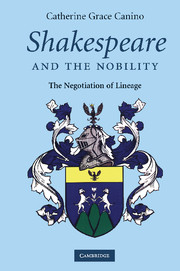Book contents
- Frontmatter
- Contents
- List of illustrations
- List of appendices
- Acknowledgments
- Introduction: the nobility and genealogy
- 1 The Staffords (Dukes of Buckingham)
- 2 The Dukes of Suffolk
- 3 The Nevilles (Earls of Warwick)
- 4 The Talbots (Earls of Shrewsbury)
- 5 The Cliffords (Earls of Cumberland)
- 6 The Stanleys (Earls of Derby)
- 7 The gentry (William Lucy, Lord Saye)
- Conclusion
- Appendices: genealogical charts
- Index
7 - The gentry (William Lucy, Lord Saye)
Published online by Cambridge University Press: 03 July 2009
- Frontmatter
- Contents
- List of illustrations
- List of appendices
- Acknowledgments
- Introduction: the nobility and genealogy
- 1 The Staffords (Dukes of Buckingham)
- 2 The Dukes of Suffolk
- 3 The Nevilles (Earls of Warwick)
- 4 The Talbots (Earls of Shrewsbury)
- 5 The Cliffords (Earls of Cumberland)
- 6 The Stanleys (Earls of Derby)
- 7 The gentry (William Lucy, Lord Saye)
- Conclusion
- Appendices: genealogical charts
- Index
Summary
Shakespeare's characterizations of the major nobles in the Henry VI play group have their geneses in the historical chronicles of the sixteenth century. It was the chroniclers – Fabyan, Polydore Vergil, Hall, Holinshed, and Baldwin – who first breathed life into the historical figures of Suffolk, Clifford, Talbot, and Warwick, figures who, being neither kings nor victors, might otherwise have been forgotten by all but their own descendants. Shakespeare, inheriting the legacy of the chronicles, took the characterizations he found and inserted his own genius into them, augmenting, diminishing, and even altering the characters completely; nevertheless, the germ of their creation did not lie with him. However, there are some historical figures, either barely mentioned or completely nonexistent in the chronicles, whom Shakespeare not only develops as significant characters but to whom he also provides important functions in the plays. The most interesting of these characters, in terms of this study, are Sir William Lucy from 1 Henry VI and Lord Saye from The Contention and 2 Henry VI. Each of these characters has a small but important role in their respective plays, which Shakespeare creates independently from his historical sources. Each of these historical figures also had descendants who had gained some prominence in Shakespeare's time. While these characters have been virtually ignored by literary critics, they may actually provide the best evidence that Shakespeare was indeed influenced by the genealogical consciousness in his society.
- Type
- Chapter
- Information
- Shakespeare and the Nobility , pp. 203 - 219Publisher: Cambridge University PressPrint publication year: 2007

